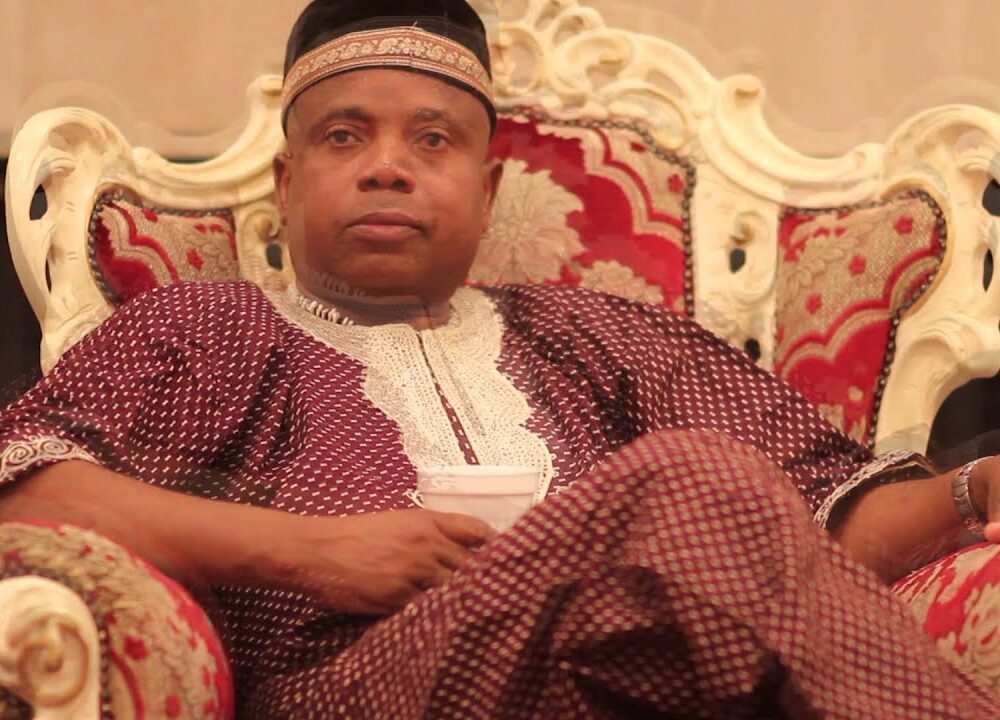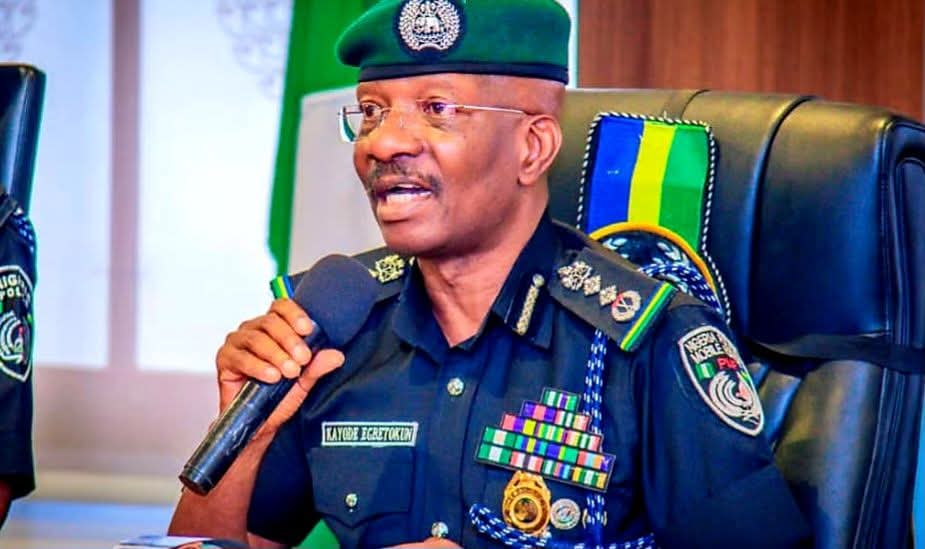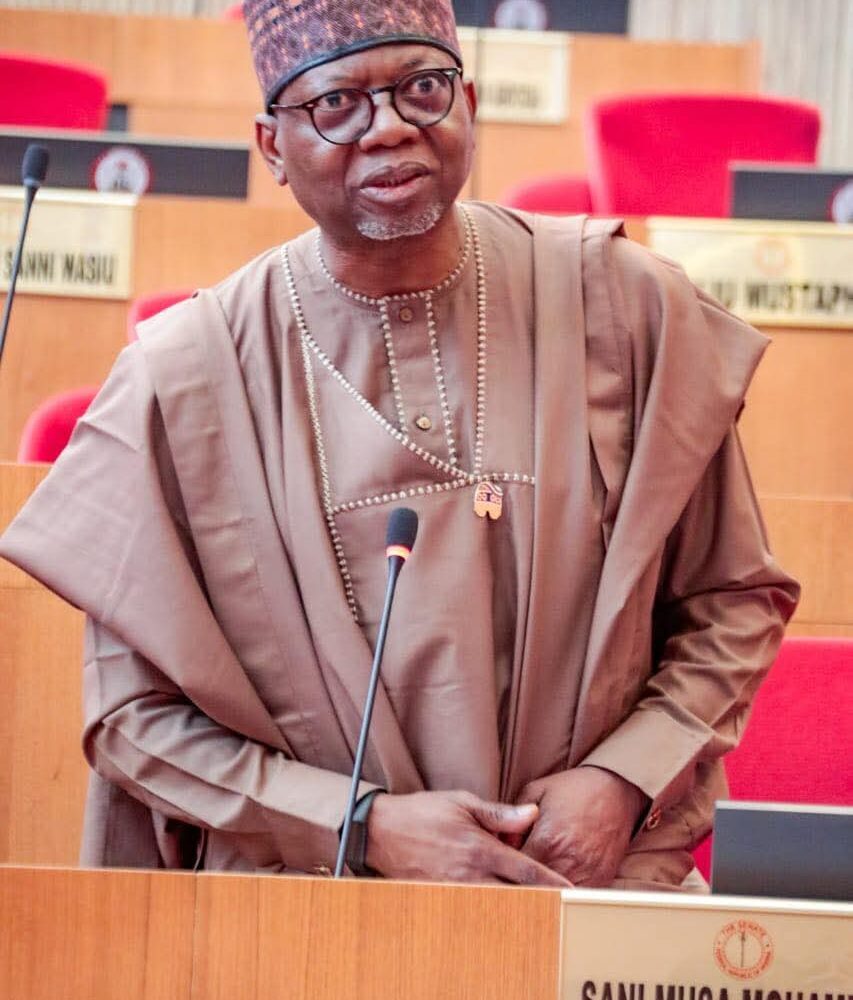The people of Lagos should thank their stars that their state is not a country. If it were, it would have seen worse times than Gabon of the Bongo family. Even without being a country, Lagos already has big and small Bongos with each of them exacting worship from wayfarers and home-sitters. One of them is Mudashiru Obasa, Speaker of the state House of Assembly who was “seized by courage” last week while discussing the rejection of almost half of the commissioner-nominees submitted to him for confirmation by his “colleague”, the governor. Obasa said calmly that his House had “said no and it remains so.” I watched his video with a lot of sorry. Very regal Obasa winked into the cameras and in his royalty asked all of us to look into his eyes. “Do I look like someone who can be threatened?” He asked that question and smiled. He then warned “the man living in the glass house not to throw stones. If he throws stones, the glass will be shattered.” The Lagos State governor’s office is the “glass house.” The man who ‘lives’ there is Babajide Sanwo-Olu.
On July 25, 2023, Governor Sanwo-Olu submitted 39 names to the House of Assembly for screening and confirmation as commissioners. The Obasa-led House sat and rejected 17 of the nominees; it confirmed 22. I am not interested in the rejection or confirmation, success or otherwise of any of the nominees but I am interested in the rhetoric of the rejection and the sole coded reason for the rejection of the rejected: politics. The speaker dropped that information. He said by not confirming those 17, he was protecting his party. His words: “I am trying to protect my party and I will continue to do that. We are not going to sacrifice service to our people in the name of technocrats, no. We have said no and it remains so…” Then he asked us to “get this right”, that he and his people had their “constitutional responsibility” and had “exercised the responsibility by clearing some and denying some.” He said his House had its “reasons for saying no” which “people making inputs left and right do not know.”
The enemy of the House of Assembly is on the social media but Obasa spoke of his aversion to the social media. He, however, said he uses WhatsApp and then mentioned “back book, Facebook, Twitter and the rest.” He warned “fourth columnists” to stop their mischief. He said there was no basis for him to fight the governor: “The governor is a brother, is a friend, is a colleague in serving the people of Lagos State.” If you doubted the speaker’s superior pedigree to the governor’s, listen to him: “The governor has been around for long. He was SA to the former deputy governor, Otunba Femi Pedro. While he was serving as S.A. to the former deputy governor, I was in this House, (as) chairman, House Committee on Rural Development. He was S. A. Establishment, Pension; I was chairman, House Committee on Public Accounts (Local Governments). And when he was heading LSPDC, I was Chairman, House Committee on Economic Planning and Budget… (then) I was the speaker of this House. And, when he became the governor, I remain the speaker.” What Obasa did not say was louder than what he said. He is 50 years old, sixteen of those years as a lawmaker; he has been elected five times into the House of Assembly. Lagos has a mortar and pestle situation; you don’t use the pot to cover its cover. Lagos did; something will crack – or “will be shattered”, to use the speaker’s words.
Who really is the captain of the Lagos ship? Was that long story about who was what before now necessary? Is the fact of Obasa’s long years in the House of Assembly enough to put him at par with the governor? If all the governor had been in politics was a special adviser here and there, should that diminish him in the eyes of the lower rung of Lagos political ladder? Did our ancestors not say that admission into the sacred grove is not a criterion for becoming an elder? What I mean here is better said in Yoruba: kò d’ìgbà tí a bá wo igbó’rò k’a tó d’àgbà awo.” In any case, when a child has been invested with the sacred costume of his family masquerade, he has become an elder and must be accorded all the respect and reverence which that status demands. Why would Obasa use the eyes of yesterday to look at Sanwo-Olu, his boss and governor? Or is the governor of a state no longer the state’s number one citizen and the speaker number three?
Obasa had no apologies for being a politician and for promoting politics over competence and he said so: “They said we are placing politics ahead of technocrats. What technocrats? What do you mean by technocrat? Who is more technocrat than (we) in this hallowed chambers?…It is not about qualifications; it is not about experience. It is not about exposure. We are the representatives of the people; the mouthpiece, the ears and the sight of the people. So, we know what we looked for. You may have this degree, you may have that degree; it may not be enough. We are given a responsibility by the constitution and we have done what we believe was the best in deciding…They talked about so many people, technocrats, technocrats; what do you mean by technocrats? I am a politician and I will remain a politician. I am not going to deny that. We must understand what a political party is. It is about a group of people who aspire to gain power, so we have the power since 1999 and we have to sustain it. We must protect our party. We’ve had technocrats in the past and these would come and go but we will remain…”
You’ve heard Speaker Obasa speak dismissively about degrees, learning, qualifications, experience and professionalism. You heard him when he asked who else could be “more technocrat” than himself and members of the House. Lagos calls itself ‘Centre of Excellence.’ And, I also ask: What can be more excellent than being ruled by the knowledgeable? Lagos is a core part of Yorubaland, Nigeria’s pacesetter in matters of education and human capital development. In the whole of the 19th century (1800-1899), the entire area now called Nigeria produced eight medical doctors; seven of the eight were Yoruba. And, in case, you want to argue this point, I give the names of these pioneers in medical practice: There was William Davies who bagged the M.R.C.S. of England at King’s College, London in 1858 and became a medical doctor. There was Nathaniel King (1874), Obadiah Johnson (1884), John Randle (1888), Orisadipe Obasa (1891) and Akinsiku Leigh-Sodipe (1892). The last in that century was Oguntola Sapara who obtained the L.R.C.P. and S. of Edinburgh in 1895. He and the earlier six were all Yoruba. Africanus Horton (1858) was the only doctor who wasn’t Yoruba in that century. He was Igbo (see Adelola Adeleye’s ‘Some Early Nigerian Doctors’, in ‘Medical History’ ; 1974, vol. 18). The author, Adeleye himself, was a professor of Neurological Surgery. He was the second Nigerian to qualify as a neurological surgeon. The first in that field was Professor Emanuel Olatunde Alaba Olanrewaju Odeku. Both of them were Yoruba. In fact, Odeku was the first African neurosurgeon to be trained in the United States. He established the National and West African Postgraduate Medical Colleges. The same Yorubaland that produced all the above is now the proud producer of a Lagos State House of Assembly which has unabashedly elevated politics above education. Obasa said: “We are not going to sacrifice service to our people in the name of technocrats, no.” What is the meaning of “service to the people”?
The fight in Lagos is not because the people are suffering; it is because politicians want to continue to eat. Before Obasa’s televised speech surfaced online, a member of the House had explained the philosophy of the politics of the Assembly and the reason for rejecting the “technocrats.” The member dipped deep into the pouch of esotericism to answer those who may be asking why politics would trump sound professionalism. He said “Babaláwo kò t’orí Orunmila se’fá (Babalawo did not procure his Ifa divination assets because of Orunmila)”. In plain language, what the gentleman said is that no one is in this business of politics because of God or man. It is for the self. The video of what that legislator said is online; the gentleman is quite lucid, you can listen to him.
We are learning from Lagos. Everyone is in the racket of Nigeria for himself. What the House members were voted to protect is “the party”, not the people. Even then, I feel like asking them: How do you use this crisis, the self-disgrace to protect your party? It is like killing a person because you love them. It happened to a lineage in Yorubaland. Some oríkì lose their beauty in translation. One of such is this lineage with an ancestor who loved his wife so much he vowed that the rains must never beat her. He was on the farm with the wife, the skies were pitch dark and certain to rain. There was no tent, no hut to run into. Lover looked at his lady, at her beauty and her hairdo and remembered his vow. The rains may beat other parts of her body but not the head. What did the husband do? He neatly cut the head and put it in a pot, safe from the torrential rain. The rains came and ended but the wife’s head would no longer stand on the wife’s neck. You should remember hearing this in Ayinde Barrister’s elegy for Moshood Abiola: “Omo òjò sú/ l’a m’órí ìyàwó bò oko;/ Òjò dá tán,/ Orí ìyàwó ò dúró l’órùn mó…
Someone said Obasa and the House are confident in their politics because they believe the leaders of Lagos might be behind them. But has Obasa heard this proverb before: “A bá ni dá kìí bá ni dé’bè…(the one who encourages one to sin never follows one to answer the charges).” During the (Yoruba) Kiriji War of 1877 to 1893, an indulged slave of Aare Onakakanfo Momodu Latoosa insulted an Ibadan war chief. The war chief’s mother in Ibadan sent her son’s delicacy of èko to him at the war front. Aare Latoosa’s slave snatched the food from the messenger, ate it and damned the consequences. The slave had everything going for him because the Aare Onakakanfo was his boss. What happened to the impudent, insolent slave? I quote directly from Samuel Johnson’s The History of the Yorubas: “Unfortunately, the Aare took the matter lightly. Instead of dealing out sharp punishment to the slave, he left him to dispute the matter with the Seriki. He even attempted to shield him before the culprit was forcibly brought forward. The Seriki then asked him: “Did not the messenger tell you the things were mine”? He answered “Yes, he did, but how am I to know that he was speaking the truth when he said ‘it is the Seriki’s? I thought he was deceiving me.’ There was no apology made, his master looked on amused. The Seriki thereupon arose, unsheathed his sword, and with one sweep severed his head from his shoulders in the very presence of his master….All the war chiefs present neither moved nor said a word…The meeting was immediately adjourned” (see page 501-502). The slave was rude because he was aware that his boss loathed the war chief. But his death, Samuel Johnson said, left the Aare “imperturbable as usual.” The lesson there is encased in the proverb at the beginning of this paragraph.
In case the speaker thinks the House is wholly his in this matter, he should read the story of a Baale of Ibadan who lost all in 1914. Baale Irefin was pressured by his chiefs to write a petition against the Resident, Oyo Province, Captain Ross, and the Alaafin. He wrote and they all affixed their thumbprints to their text of complaints. But the chiefs later met the government and wrote a counter-petition disowning Irefin and his letter. They said the Baale forced them to put their thumbprints on the offensive document. Irefin lost his throne and his life. In that same Ibadan, there was also Balogun Ola who thought other chiefs were with him in the fight against negative colonial actions in Ibadan affairs. Ola had gone too far in the battle before he realised that he was alone; his colleagues had withdrawn from that cause. The Balogun lost his title and his life. He was asked to kill himself or leave the town. The one who preferred death to shame put himself to sleep one bad day in 1917. Ibadan’s history is a composite account of all manners of intrigues politicians are capable of. The records say so and that is why I cited those two cases as a sermon to the feuding strongmen of Lagos. There may be no winner in their fight.
I know that what the speaker of the Lagos State House of Assembly said elevates politics above learning, but
the members (and other politicians in all other states) will help their career by reading some books and articles of history. They should read: Oba Isaac Akinyele’s Iwe Itan Ibadan (1916/1981); Samuel Johnson’s The History of the Yorubas (1921/1966); Toyin Falola’s, The Political Economy of a Pre-colonial African State (1984); and his ‘Politics and Economy in Ibadan’ (1989). They should also read Ruth Watson’s ‘Civil Disorder is the Disease of Ibadan’ (2003); read Olufunke Adeboye’s “Iku Ya J’esin” (2007) and all others from Bolanle Awe, J.A. Atanda, R.C.C Law to J.D.Y. Peel and William Bascom. Reading a few pages in these texts may be their journey to Damascus; they may agree that playing politics is good but providing good governance is better. My final point is that politicians and their backers can take care of their party men without slamming the door on what Speaker Obasa sneered at, blindsided and called “qualifications, experience and exposure.”





